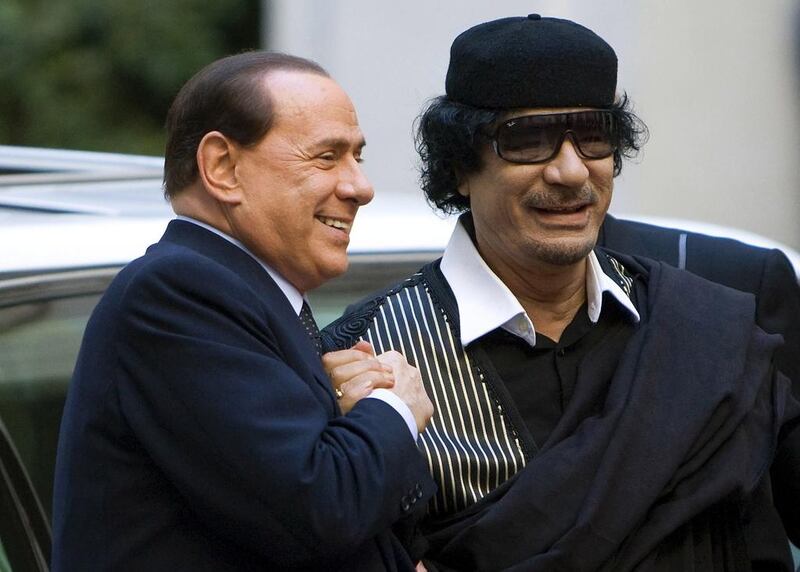In the pre-Arab Spring era, southern European countries used to reach bilateral security agreements with their African partners to control the flow of migrants.
For example, Silvio Berlusconi, the former Italian prime minister, and Muammar Qaddafi, the former Libyan president, signed a “Treaty of Friendship, Partnership and Cooperation” in 2009.
The treaty, which was signed under the smoke screen of recompensing Libya for historical abuses committed by Italy in colonial times, was aimed at stopping the arrival of African migrants to Italian shores.
The Berlusconi-Qaddafi deal was met with stinging criticism from international humanitarian organisations, mainly for the infamous politics of respingimenti, which consisted of returning migrants and refugees to Libya without determining if any were in need of assistance or protection. The treaty closed both Italians’ and Europeans’ eyes to the condition refugees were facing in Libyan detention centres.
It would have been impossible to predict that only a few years later the Berlusconi-Qaddafi treaty could be viewed as a model for Europe.
Following the recent agreement with Turkey, structured in a similar way to the respingimenti model, rumours about under-the-table and informal agreements between EU institutions and African states recently began to appear in several European media outlets.
Libya is undoubtedly on the EU's radar, helped by the confusing narratives of the ISIL threat, a possible international military intervention to stabilise the country and unceasing migrant tragedies in the Mediterranean.
Italy has lately enhanced its historic role as privileged interlocutor, and has shown support for the UN-backed government of Fayez Al Sarraj, although direct Italian intervention on Libyan soil will probably never happen.
The current Italian government knows that a military solution would have a terrible impact on public opinion, especially as a historic referendum aimed at changing the Italian constitution is due to take place before the end of this year.
But even a tough deal on migrants with Libya will probably meet less internal opposition.
Matteo Renzi, Italy's prime minister, recently proposed to the EU the so-called “migration compact”, which has been labelled as innovative in some quarters, but is mainly based on the same old formula of leaving African countries to deal with migrants and refugees, and draws clear inspiration from the recent EU-Turkey deal.
Ahmed Maiteeq, Libya's vice chairman of the presidential council, has been touring Italy, lobbying for the country to take a prominent role in supporting Libya in its battle against ISIL.
During a second visit in less than a month he suggested the old Qaddafi-Berlusconi deal on migrants should be revived.
Libya's UN-backed government has mooted the possibility of building, with assistance, new centres for refugees on Libyan soil, and reiterated its commitment to erasing the ISIL threat and achieving lasting stability.
As a consequence, too, of the daily tragedies on the Mediterranean, Angelino Alfano, Italy's minister of interior, has been calling for an urgent deal with Libya, “in order to build refugee camps in Africa and organise repatriations”.
Beside the natural scepticism over the possibility of the successful implementation of such goals in a short period of time, more concerns come from the suggestion of putting the past migration deal in place once again.
The ignominious Berlusconi-Qaddafi treaty reduced the flow of migrants on this route – at least until Qaddafi was removed from power – but it was delivered with an high humanitarian cost. To revive it would be another tremendous mistake – not just for Italy, but for Europe.
The deal would push refugees and migrants back to another unstable country where the ongoing conflict is far from being resolved and where they would face horrible detention conditions, just like in Qaddafi era.
Similar concerns were raised in a recent Amnesty International report based on interviews with migrants arriving from Libyan's detention centres who are now settled in the southern Italian regions of Apulia and Sicily.
Most of the testimonies speak of abuses, indefinite detention, facilities that are ruled by ruthless armed groups and guards selling migrants to human smugglers.
Does Europe really want to make another humanitarian mistake?
The only difference with the recent past is that this time it will not just be enough to criticise the deal as the result of a friendship between a populist and misogynous politician from the south of Europe and an eccentric authoritarian ruler from Africa. It would be a failed project that was envisaged and delivered by the whole of Europe.
Massimo Di Ricco is a writer on global politics and researcher on Mediterranean issues.
On Twitter: @riportag





